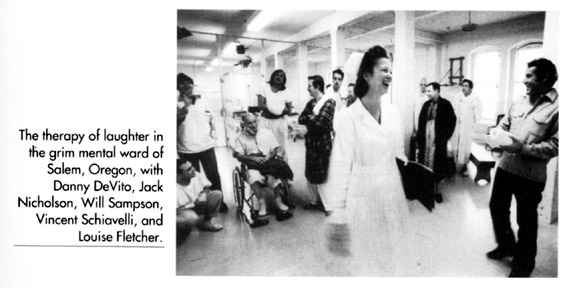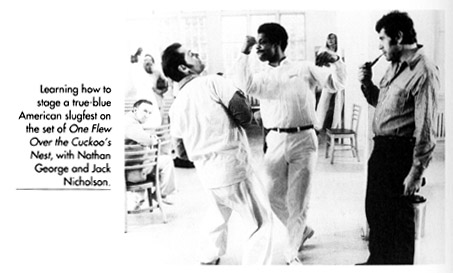
TURNAROUND: A MEMOIR



TURNAROUND: A MEMOIR


By MILOS FORMAN & JAN NOVAK
When I cast a film, I view the world with different eyes. I can't mail a letter without considering the postal clerk for a part in my film. This compulsion subsides once I move on to a different phase of moviemaking, but it never completely leaves me.
In Cuckoo's Nest, for the first time in my career I had professional actors in all the principal and secondary roles. My cast members could no longer just be themselves. I thought Jack Nicholson would make a great McMurphy. "Hell, Milos, I tried to get the rights to the fucking book, if you know what I mean, but but old boy Douglas beat me to the punch," said Jack when I offered him the part.
I had found Brad Dourif in an off-Broadway production of When You Comin' Back, Red Ryder? and immediately saw Billy Bibbit in him. He was dripping talent and had the core of vulnerability that was right for the role. The other patients in the ward had to be strikingly individual, so they wouldn't blend together in the group scenes. Michael Douglas brought in a short, stout actor named Danny DeVito who had acted in the stage version of Cuckoo's Nest. A casting agency sent us Christopher Lloyd, another hard-to-mistake face. His maniacal mug reminded me of my old friend from New York, Vincent Schiavelli.
It was somewhat harder to cast Nurse Ratched. In the book, she is portrayed as an order-mad, killjoy harpie. At one point Kesey even describes her as having wires coming out of her head, so I searched for a castrating monster. One day, a rather sweet actress named Louise Fletcher came to interview with me. She was good-looking, blond, slim, and polite, and she had an engaging smile. She was all wrong for Nurse Ratched, but there was something about her. I asked her to read with me, and suddenly, beneath the velvety exterior, I discovered a toughness and willpower that seemed tailored for the role.
Discovering Nurse Ratched in the prim, angelic Louise surprised me, but the more I thought about it, the more it made sense. I'd learned long before that it's better to cast against type in the leading roles and with it in the minor roles. For reasons of economy and clarity, I prefer to give the audience a quick read of secondary characters by casting obvious physical types, but with the principal roles, it's more engaging to uncover a different personality under the obvious type, to peel away the erroneous expectations, to be surprised by a deeper knowledge of the character.
In the case of Nurse Ratched, it would have been far less threatening to cast Medusa herself in the part -- one look and you'd brace yourself for evil, whereas true horror resides in the sudden revelation of a warped character that hits you when you're not prepared for it.
Copyright 1994 Villard Books.

